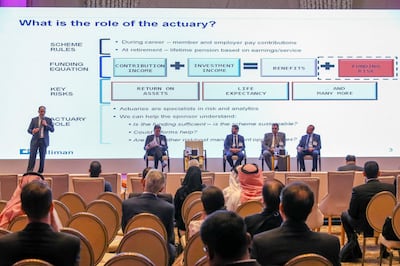Saving for retirement is set to evolve for UAE residents, according to experts, as financial advisers and employers face pressure to offer better options amid a raft of UAE government reforms.
With a new retirement visa set to roll out at the start of next year, more flexibility on visas for jobseekers and the end of service gratuity in line for an overhaul, the market is ripe for change.
“As more and more people see the UAE as a possible retirement location, the natural progression is that retirement solutions will be more closely looked at and developed,” says Stuart Ritchie, director of fee-based Dubai financial advisory firm AES International.
“The concern is, that the right people at the right level need to develop the market and govern it, before opportunists just try and make money from it.”
The long-term visa for retirees, unveiled by the government in September, allows non-Emiratis over 55 to secure a five-year visa if they have an investment property worth at least Dh2 million, or financial savings of Dh1m, or an active monthly income of Dh20,000 or more.
Meanwhile, in May 10-year visas for specialists in certain fields, such as medicine and science, were unveiled, and a six-month visa for job seekers was rolled out in June.
The visa changes highlighted the UAE’s position as a long-term destination for talented professionals but if residents choose to stay longer, they must ensure they have saved adequately for their retirement.
“There is still a lack of understanding about the adequacy of the end of service and many view it is an exit bonus rather than a retirement vehicle,” says Martin McGuigan, partner at Aon Retirement Solutions and McLagan in Dubai.
___________
Read more:
Is the UAE end-of-service gratuity set for an overhaul?
The GCC’s pension systems are ripe for reform
Is the UAE's new five-year visa a game changer for expat retirement?
85% of UAE residents still not saving enough for their future: National Bonds
__________
At the Mena Pensions Conference in Bahrain in October, analysts discussed how the end of service gratuity - a defined benefit pension scheme – requires a rethink as it does not factor in the lifespan of an employee only the years they have worked at a company.
Simon Herborn, senior consulting actuary at Milliman – Middle East and Africa says “the labour law gratuity is unlikely to be an adequate foundation” for residents in the UAE.
“For a retirement that could extend several decades, significantly more is likely to be needed,” he adds.
In the past, residents turned to financial advisory firms to top up their pension pots. However, many were mis-sold poor performing long-term savings and investment plans riddled with high fees and hidden charges.
A raft of new regulations were proposed in 2017 by the UAE Insurance Authority and the Central Bank of the UAE to clamp down on mis-selling, however they are yet to be imposed.

Mr McGuigan says the products currently offered by advisers are “not yet geared towards financial wellness post-retirement”.
“Currently the solution is often driven by what benefits the adviser most and not what benefits the consumer,” he says.
“Products must recognise that individual circumstances change, and savers need access to their money without being punished. Flexible plans which allow access without penalties, simplified choices, accessible information and app-led communication about the performance of investments are all improvements which consumers should demand. Additionally total transparency about how the adviser is being paid is a must.”
__________
Read more:
Cheaper savings product takes on the 25-year investment plan
Insurers and financial advisers at war over who to blame for poor advice in the UAE
Less than a third of UAE investors trust their financial advisers, CFA survey shows
Fixed-term investment plans are failing UAE customers, says Friends Provident
_________
Mr Ritchie agrees that many customers have been misled in the past due to the "commission culture" that focuses on what an adviser "can get from the customer rather than what they can do for the customer".
He suggests a regulatory law, where any retirement or investment solutions must explicitly show the fees, commission and penalties to ensure clients make informed choices, as well as minimum qualification levels for advisers.
“This would lead to a gradual trust building in the profession and hopefully weed out the unqualified and unscrupulous,” he says.
Steve Cronin, the founder of DeadSimpleSaving.com, an independent community for financial education in the UAE, says the industry needs a "big shake-up" to ensure advisers offer simple, low-fee flexible products that encourage investors to primarily focus on index-tracking exchange traded funds.
“The best thing financial advisers could do is stop selling long-term savings plans and whole life insurance with high fees and little flexibility. This would probably involve moving from a commission model to a fee-for-time or fee-for-platform model,” he says.
One advisory firm that has already turned its back on commission-laden plans is Abacus Financial Consultants, which rolled out its 321 Account in 2017, a lower-cost savings product that allows residents to invest on a monthly basis without being locked in to a fixed period. Billed as an alternative to the fixed-term investment plan, it charges a total annual fee of about 2.3 per cent.

“The transparency being forced upon the financial services industry by the local and international markets is having the effect of creating value for UAE residents although there is some ‘push back’ from a few companies in the market,” says Cornelius Lillis, co-founder and managing director of Abacus. “These transparent and value products have been available for years but the take up has been slow.”
Mr Cronin says more residents are now aware that low-cost, passive index-tracking ETFs are the best investment funds for expats with many choosing to invest on their own.
He recommends groups such as SimplyFI.org, which teaches people how to become financially independent and invest sensibly by themselves. “Sarwa.co is the first robo-adviser in the Middle East, offering a cost-effective solution for people wanting to invest in passive, diversified funds with a bit more support,” he adds.
Analysts stress, however, that it should not only be up to expatriate residents to make the first move to ensure their retirement is adequately funded, employers must play a part too.

Mr Herborn says employer-led pension schemes could help enhance the retirement-readiness of UAE expats.
“As a foundation, the gratuity costs employers currently face could be channelled to these schemes – potentially with some augmentation. Employees could also contribute part of their pay – either mandatorily or voluntarily. This could prove a simple, well-understood, transparent framework for UAE expats to save for their retirement.”
While the Dubai International Financial Centre is already consulting on a proposal to change the current system, Aon recently launched its Employee Saving Plan to top up an employee's existing end-of-service gratuity.
The company says its fees are “simple and transparent” with a $50 per member per year administration charge – typically paid by the employer – and a 1.5 per cent assets under management charge, which the employee pays.
“There is a definite shift within the larger international and local companies as they are taking a more paternalistic approach to how they help employees plan for retirement,” says Mr McGuigan.
“Employers should not wait for a change in the statutory provisions, rather they should find a solution which can adapt should a defined contribution model come in to replace end of service.”
Mr Lillis says employers that take the lead in offering workplace pensions will “protect their employees from unscrupulous sales people”.
“If more company finance departments took the time to vet the products and services available to their staff there would be far fewer disgruntled investors," he adds.







